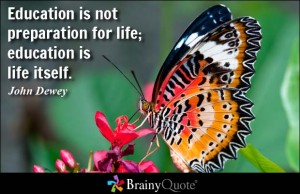Metaphor of School - Part VII

Metaphor of School and Leadership -
Part VII
It does feel as if people want school to do lots of things. Some people want it for custodial care, and that’s part of the school responsibility. Some people want it to teach the basics and not more much more, and that’s part of the school responsibility. Some people want the school to be a growth industry where innovation and creative adaptation drive a social reform effort, and that’s part of the school responsibility. Some people want it to be a place to educate for democracy, and that’s part of the school responsibility. Some people want it to do surrogate parenting, and health care – and maybe that’s a part of the school responsibility.
In none of those descriptions is the school responsibility about children growing into adults. School should be about helping, fostering, guiding, directing, and creating opportunities for children to become responsible independent adults. It just requires what it does, yet to demonstrate that adulthood means more than just holding a job and paying taxes. It also means being engaged with the world and our society. It means knowing how to be involved. It means knowing these things from practicing and demonstrating this engagement over and over. As Dewey said, “Education is not preparation for life; education is life itself.”
To be engaged in this pursuit is also about leadership. There are so many definitions of leadership and so much involved in the discussion of leadership of schools that there is at least a few books waiting to be written.
We need to look at the implications of the word “stewardship.” If the leader of the school is a good “steward,” then the metaphor of school takes a new shape. It can be an academy, it can be a bottega, it can be a garden – but it must always be under the guidance of a good steward. Twenty-first century schools are not, however, factories or prisons.
A good steward protects, but challenges; guides, but allows for risks; sets boundaries, but permits freedoms; enables, but understands consequences.
The steward of The New Classroom will create the
opportunities for each child to create evidence of excellence so that
learning is more than just conforming. The best learning is always an
exploration of possibilities.
And, in The New Classroom, students have an
opportunity to save and showcase their work through e-Portfolios, a chance
to demonstrate excellence by real, not contrived, evidence.
